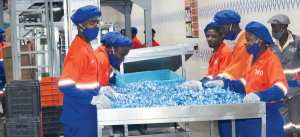Malawi’s industrial output fell by 14.4 percent in 2024 due to foreign exchange shortages that led to production cuts, according to the Malawi Government Annual Economic Report 2025. This decline contrasts sharply with the 17 percent growth recorded between 2022 and 2023.
The report indicates that the manufacturing sector dropped by 9.3 percent, while utilities suffered a steep decline of 38.2 percent. However, some manufacturing sub-sectors, such as beverages, tobacco products, and rubber and plastics, recorded growth of 2.4 percent, 14.9 percent, and 21.5 percent, respectively.
Despite the challenging start to 2024, the report notes signs of gradual stabilisation in industrial production during the first half of the year. Industrial output experienced fluctuations between January and May, with steep declines followed by recoveries. By April and May, conditions had started to improve.
The manufacturing sector recorded modest growth of 0.3 percent in 2024, but the report projects a rebound in 2025, with an estimated growth of 3.9 percent. However, Economics Association of Malawi (Ecama) president Bertha Bangara Chikadza expressed skepticism, citing persistent forex shortages and a historically slow growth rate in the sector. She pointed out that manufacturing firms rely heavily on imported raw materials, making them vulnerable to foreign exchange constraints.

Economist Bond Mtembezeka highlighted that limited access to credit for the private sector, particularly manufacturers, further compounded the sector’s struggles during the forex crisis. Manufacturers often depend on credit lines to import raw materials, and restricted access may have exacerbated production challenges.
Similarly, economist Dalitso Kubalasa called for increased financing for the manufacturing and agricultural sectors to help revive the economy. The Malawi Confederation of Chambers of Commerce and Industry (MCCCI) also identified forex shortages as a critical challenge affecting manufacturers, with Press Cane CEO Bryson Mkhomaanthu stating that the inability to secure foreign exchange has severely impacted the importation of essential raw materials.
As the country looks ahead, stakeholders emphasize the need for policy interventions to stabilize forex reserves and support industrial growth.




